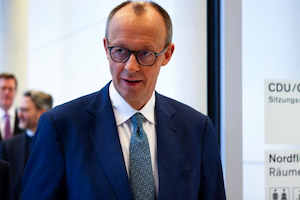German Chancellor in Turmoil After Six Months

Just six months into his tenure, German Chancellor Friedrich Merz and his ruling coalition are mired in mounting infighting, policy paralysis, and plunging approval ratings, weakening the government’s ability to counter the rise of the far-right. For the new chancellor, it has been an undeniably rocky start.
A conservative politician, Merz campaigned on promises to revive the economy, strengthen defense, and reform immigration, but he has struggled to deliver. “In postwar German political history, no government has provoked such widespread discontent in such a short time,” said Manfred Guellner, head of the polling institute Forsa, in an interview with AFP. “Those who expected stronger leadership from the new government are now almost universally disappointed,” he added.
Merz’s center-right Christian Democratic/Christian Social Union (CDU/CSU) alliance won the February election, but recent polls show it neck and neck with the far-right Alternative for Germany (AfD). The AfD, which finished second in the election, has since become the largest opposition party in parliament.
Meanwhile, the center-left Social Democratic Party (SPD), led by former Chancellor Olaf Scholz, continues to languish after its electoral defeat, polling at just 13% to 15%. CDU lawmaker Roderich Kiesewetter admitted that “many citizens are clearly dissatisfied and disappointed with the government’s performance,” criticizing it for being “too focused on immigration while neglecting key issues such as the economy, education, and security.”
Tensions within the ruling coalition have been escalating. Since Merz failed to secure confirmation as chancellor in the first round of parliamentary voting in May, divisions within the alliance have deepened. In July, negotiations over the appointment of three Constitutional Court judges collapsed, with conservatives accusing the SPD’s nominees of being “too left-leaning.”
A group of young conservative lawmakers has publicly opposed the cabinet-approved pension reform plan, claiming it would “burden future generations.” Meanwhile, the government’s military service reform, seen as a symbol of Germany’s leadership role within NATO, has stalled amid disputes over whether to reintroduce limited conscription.
Further controversy erupted when Foreign Minister Johann Wadephul, a close ally of Merz, expressed reservations about deporting Syrian refugees from Germany — sparking backlash from conservative ranks.
According to Aiko Wagner, a political scientist at Free University of Berlin, the simultaneous decline in support for both the CDU/CSU and SPD has made it “increasingly difficult for the two parties to find common ground.” He noted, “Both sides fear that any compromise could further alienate their core voters.”
- 46 reads
Human Rights
Fostering a More Humane World: The 28th Eurasian Economic Summi

Conscience, Hope, and Action: Keys to Global Peace and Sustainability

Ringing FOWPAL’s Peace Bell for the World:Nobel Peace Prize Laureates’ Visions and Actions

Protecting the World’s Cultural Diversity for a Sustainable Future

Puppet Show I International Friendship Day 2020

